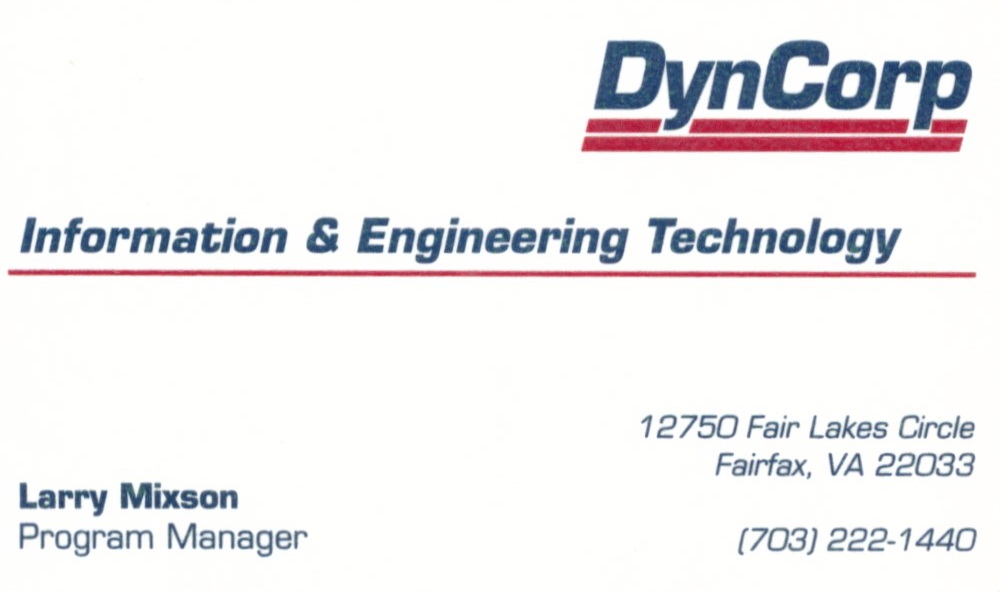

1996
DynCorp

The BUPERS contract to scan the old microfiche records finished and considered a success and I started working on Phase II of the BUPERS project which was to scan new paper records into the system. With over a million active members, that is a lot of records. Scanners were added that would scan each record which then would go to a team of data entry staff (all women) who then would type in the basic information, name, dated, record type, etc. which would be added to the database while the image stored on the optical disks. It all worked pretty well but even with six scanners, it was hard to keep up with all the papers until someone came up with the idea of scanning the pages sideways. Scanners scan pages at a certain speed and it took so many seconds to scan the 11 inches of a standard page. If you turn the page sideways, you only scanned 8 ½ inches, 33% faster, problem solved. Well mostly, the scanners were to run eight hours a day but would start jamming up after an hour or so. As it turned out, paper has dust and other small, mostly unnoticeable, particles on it and it would come off while scanning causing problems. The rubber wheels that pulled paper from the stack would get slick and not pull, paper dust would come off on the scanner head and so on. The solution was simple, stop every hour and clean the scanner, which reduced productivity. Problems were identified and solutions found, and the system went into production.
At this time the Navy had decided to move the entire BUPERS division from the Navy Annex by the Pentagon to Tennessee. At the same time there were some changes to the Dyncorp management which were not to my liking. My manager from when we were CBIS and for the initial BUPERS contract I really liked and got along with. After the initial contract was completed, they brought in new management and laid off my original boss and I then reported to a new one who I didn’t like as much.
The thing about working for a company that does government contracts is that it is good when you have a contract, not so good when you don’t. With the BUPERS contract completed I was in between contracts, “Don’t worry.”, management told me, I would work on the proposal for the BUPERS which DynCorp was assured to win the contract and I would be assigned to the project. The thing is I was now considered “overhead” since I could not bill my time to a project and management hates overhead as it cuts into their profits. When projects were finished, ideally staff would be moved to other projects, but if not, it was not uncommon for them to be laid off. This was one reason why contractors were popular, no one felt bad about letting go a contractor, but employees were different, companies tried to keep them on between projects, but sometime had to let them go. From the company’s view this could be a good thing as it would allow them to get rid of lower performing staff. One thing on my side was that I was considered “key staff”. Government RFPs often specified that “key staff” be specifically identified in the proposal and thus if one is written into the proposal, they pretty much have to keep you employed.
I was given technical sections of the RFP which I had to write the proposal responses to. The BUPERS RFP was over an inch thick, page after page of details that our proposal had to address. Our proposal for the Phase II project was almost three inches thick. I soon hated proposal working on proposals. Several companies were responding to the BUPERS Phase II project and there would be meetings held by the BUPERS staff at the Navy Annex to address questions about the RFP. Being the incumbent having done Phase I, DynCorp was expecting to win the Phase II project, but it was not guaranteed.
I would be a couple of months before BUPERS would award the contract, and there was no guarantee that DynCorp would win the project, I was getting uncertain about my future at DynCorp. Even if they did it, much of the work was going to be in South Carolina and I didn’t care much for traveling to South Carolina and I sure wasn’t going to move there. As such, I started looking for a new job and soon found a job with Bell Atlantic Video Systems.
Updated: 03-07-2024